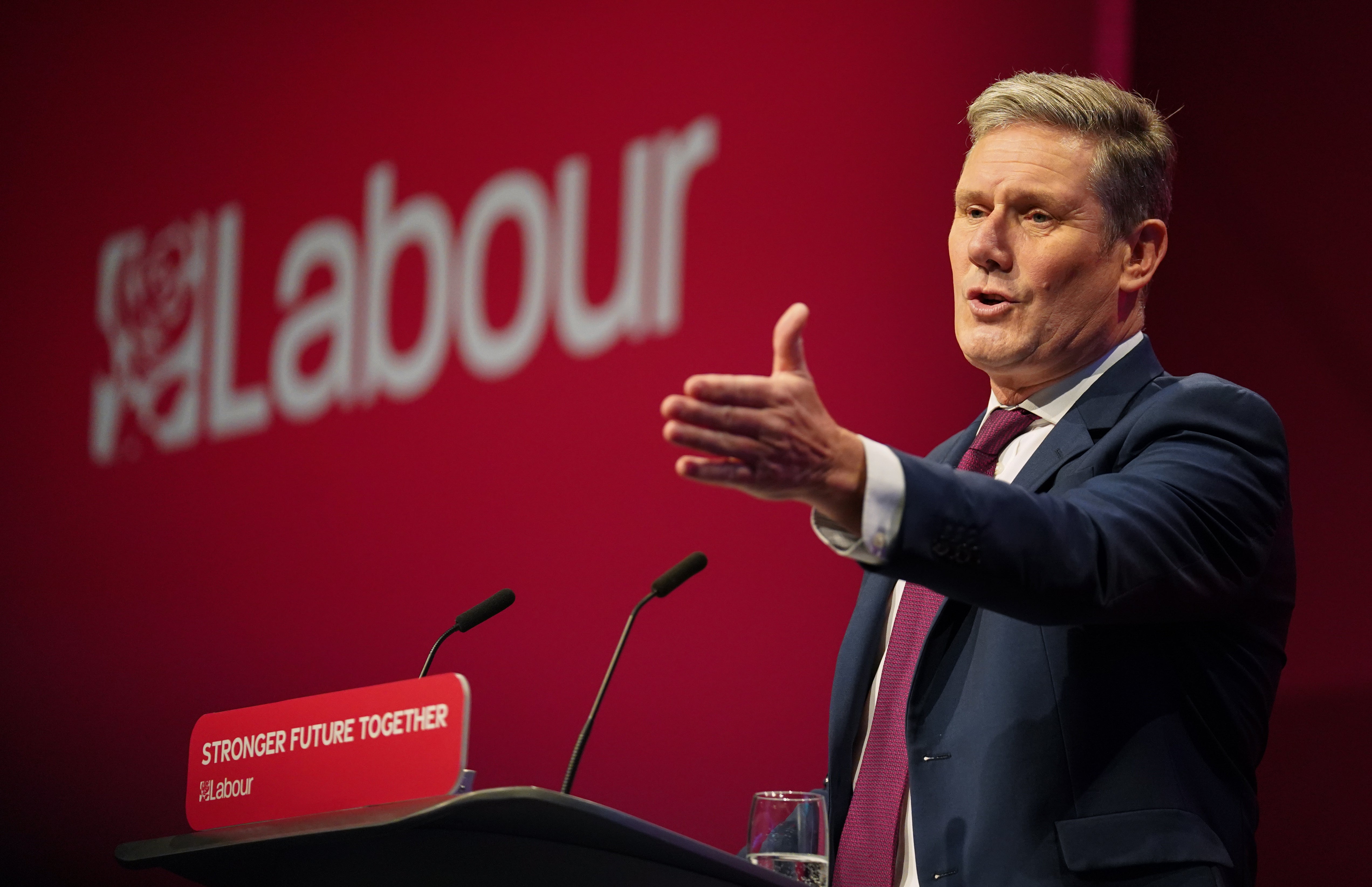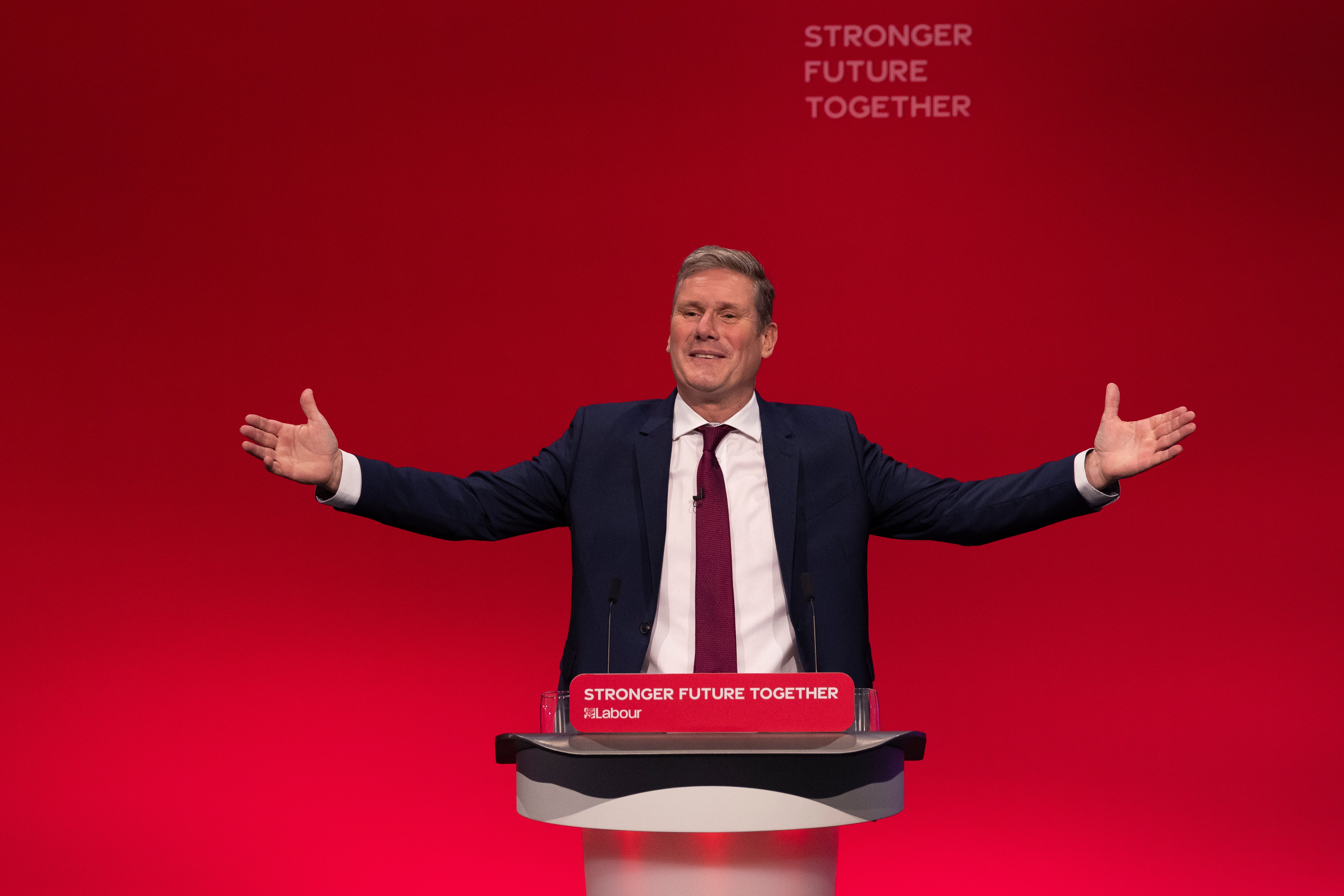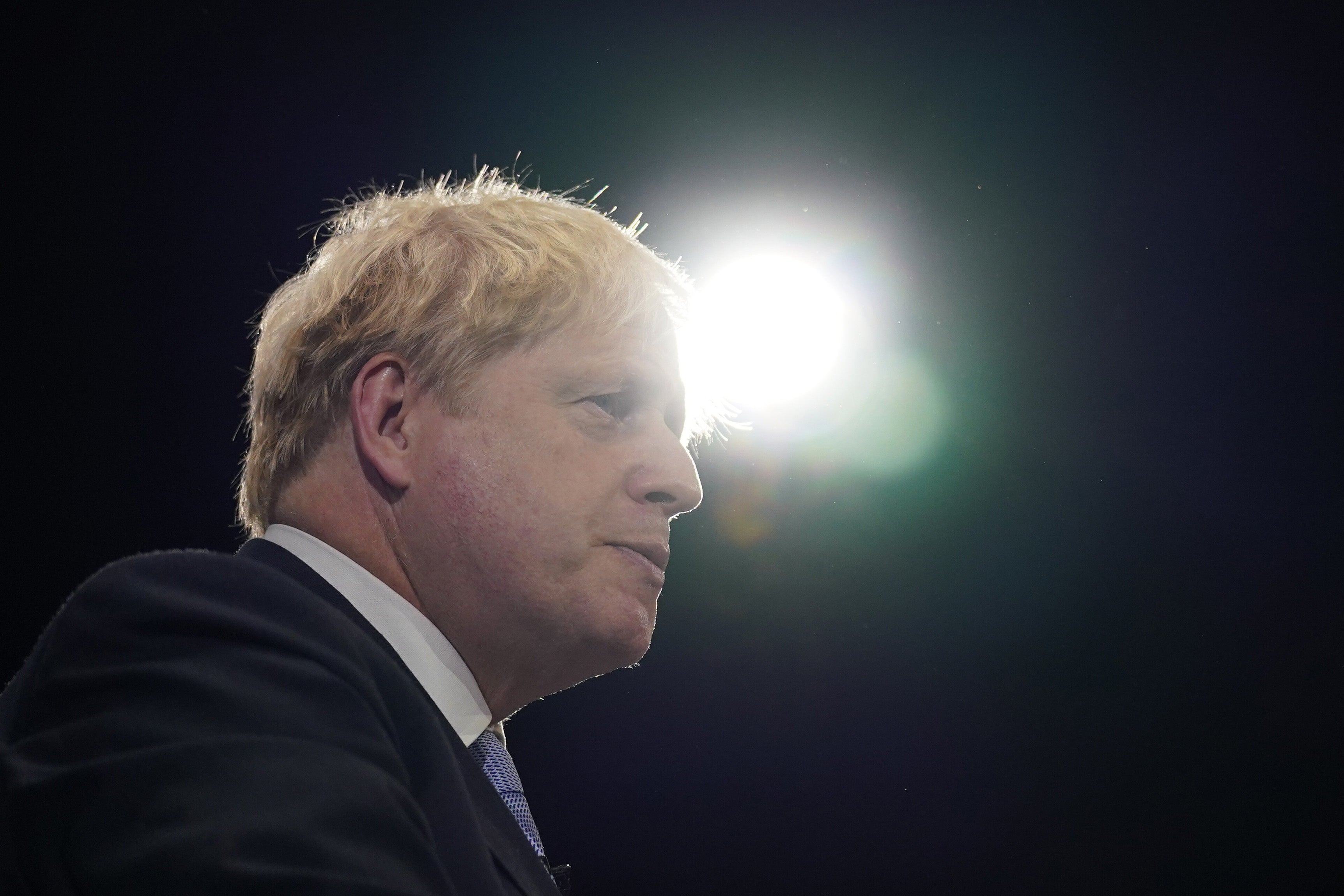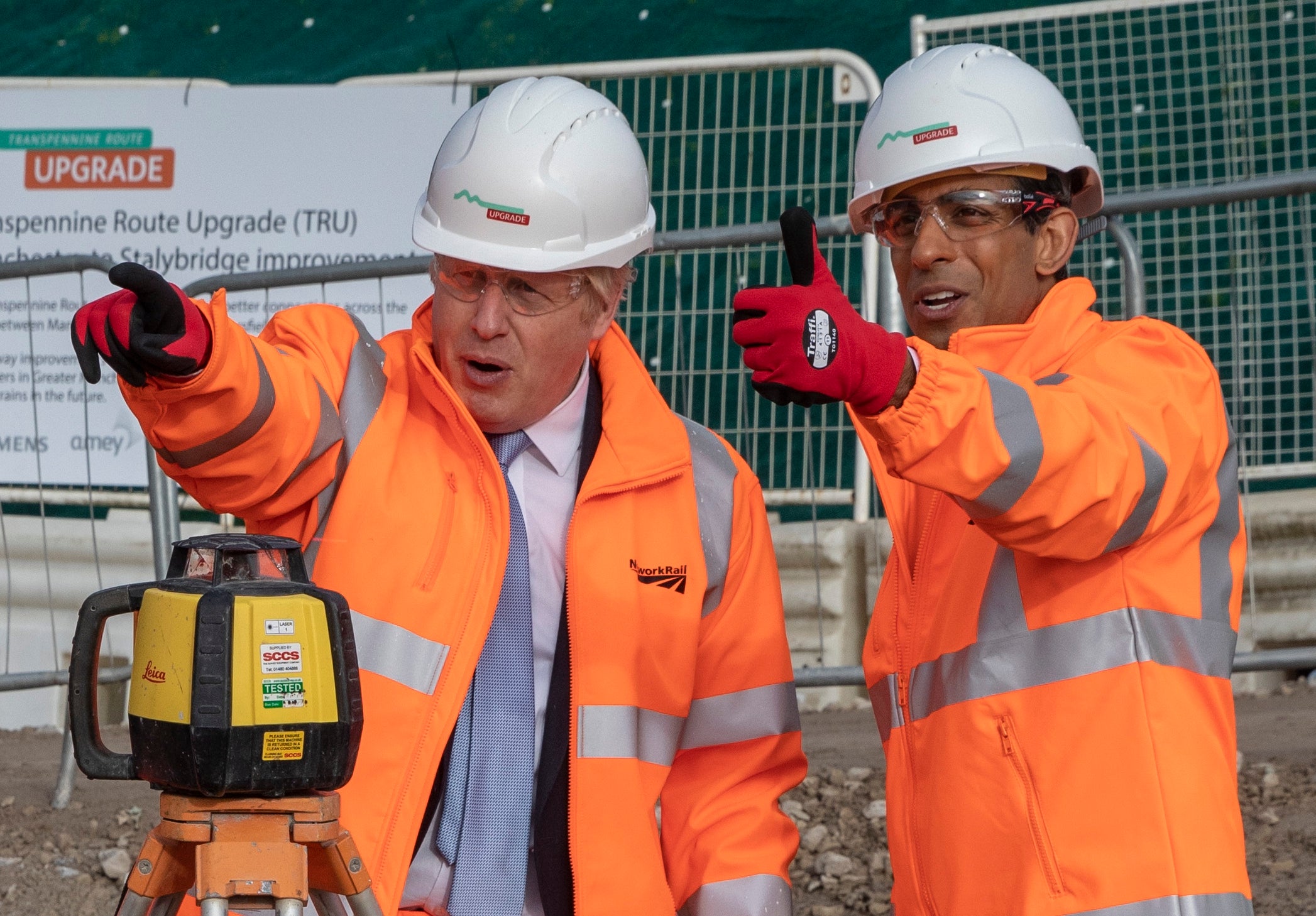The pandemic has changed us, but Labour can’t rise to the challenge
Keir Starmer wants us to believe that the country discovered a better, more Labour-inclined way of doing politics during the crisis, but is it true? John Rentoul looks at the evidence


The pandemic has changed many things, and Keir Starmer certainly wants it to have changed the country. This is not surprising, because previously the country didn’t often vote Labour. So he wants to believe that the crisis has shaken people out of their Conservative-minded ways. He argued in his Labour conference speech that the crisis had revealed the best of British solidarity. He said a Labour government would “address the chronic problems revealed by Covid, with the kindness and the togetherness that got us through”. It is a plausible enough idea, but is it true that the crisis has changed the country in ways that make a Labour election victory more likely?
Let us look first at how the crisis has changed us. You cannot have a government borrow and spend an unexpected £400bn without it having a lasting effect. You can’t have an outbreak of disease on such a scale without it leaving the public health system of any country struggling for many years. And you can’t change so many people’s behaviour, reducing social mixing – by working from home, being furloughed and staying away from school – for so long without leaving some kind of mark.
Not all of the changes will be lasting. I am sceptical about people working from home more in the long run. There may be a one-off effect in bumping up a trend that was already happening, as people and companies discovered that there were all sorts of things that could be done effectively outside an office, but I think that most people who were working in offices before will go back to working in them most of the time. The hidden hand of the market put people in offices over the decades because that is the most productive way of working, and it will put us back in offices once the pandemic is over. Even so, there are many changes that will take a long time to unwind, and which will never go back all the way to where they were.
Starmer is also right that the pandemic has revealed many things that we might have guessed but hadn’t really appreciated. There is a computer program called Zoom, apparently. We have learned that a whole new sector of the economy, of dark kitchens and delivery bikes and 15-minute shopping apps, can spring up in a matter of weeks. We now know better that there are a lot of key workers apart from doctors and nurses and care workers: there are also shop workers and lorry drivers who keep the fabric of society together.
We learned lots of things about ourselves. A surprising number of us didn’t really mind having our social lives abolished. A lot of us liked staying at home and being told what to do. We learned that very few people really care about civil liberties. The government managed to make all protest illegal, without really meaning to and without realising it had done it. I remember Priti Patel, the home secretary, asking Black Lives Matter demonstrators to please observe social distancing, apparently unaware that her government had banned any gatherings of more than six people for any purpose not on an exclusive list, which did not include protest or free expression.

I remember the rules kept changing, and the prime minister got completely confused in a live TV news conference when he was asked what they were. But most people accepted that there should be rules, that the government should lay them down, and that they should have the force of law. Indeed, most people, most of the time, thought the rules should be stricter than they were.
I haven’t seen the question asked in an opinion poll recently, but I suspect that there is still a majority in this country for closing our borders altogether. Again, I vaguely remember a befuddled Boris Johnson trying to explain to the House of Commons that a “fortress New Zealand” policy wasn’t possible in Britain because so much of our food and medicine comes in and out of the country through the Channel tunnel.
That instinct to shut out the world produced one of the most obvious political effects, in that we saw a rise in support for devolved governments around the UK, and in Scotland we saw a sharp rise in support for independence (which has since subsided again). Nicola Sturgeon, Mark Drakeford and Andy Burnham all asserted themselves as leaders whose job was, in part, to protect their people from a virus brought in by outsiders.
Starmer agreed the money was needed but criticised the tax rise, saying that ‘working people’ shouldn’t have to pay – but without saying who should, beyond some vague talk about stocks and shares and people with a lot of properties
But for all Starmer’s attempt to bend the pandemic to Labour’s purposes, I don’t think the net effect of all those changes is necessarily to create a United Kingdom that is more likely to vote Labour next time. My argument is that the pandemic has changed attitudes to what governments can and should do, but that this has had little net effect on our politics.
The main reason for that, I think, is that Boris Johnson and Rishi Sunak reacted to the crisis with the speed, pragmatism and ruthlessness that have long given the Conservative Party its historical advantage.
Never mind how Johnson handled the pandemic itself. I think almost any recent prime minister would have handled it better: Theresa May, David Cameron, Gordon Brown, Tony Blair, Margaret Thatcher. Probably even John Major. They would have been quicker to react, more focused, more rigorous, more decisive. But I don’t think anyone can know how much difference it would have made, because all countries have been affected differently for reasons that seem to be largely independent of the competence of their leaders. You and I might think that Johnson has blundered through it, but most voters seem to take the view that he faced an impossible challenge – and they give him some credit for our early vaccination programme.

Yet when Johnson and Sunak responded to the economic effect of lockdowns, they did so with astonishing agility. The furlough scheme and the huge subsidies for companies cut across Sunak’s previous presentation of himself as a small-state Thatcherite, and left space only at the edges for Labour to argue for more government action. Most of us did not previously think that it was possible or desirable for the government to act as an employer of last resort in peacetime, or that it was sensible to borrow and spend £400bn in 18 months.
Most of us would have thought that such a policy – once we had realised that it was needed – might have come more easily to a Labour government and a Labour chancellor, while their Conservative equivalents would resist it. But it was Sunak – who had been in the job a few weeks, and who delivered a Budget on 10 March 2020 that was wiped out over the following days by ever more shocking new announcements – who said that “the overwhelming might of the British state will be placed at people’s service”.
There have been two responses from the Labour Party to this extraordinary development. One was Jeremy Corbyn’s claim that this vindicated his policies, just three months after they had been rejected by the voters in the 2019 election; that it proved that you could spend hundreds of billions of pounds on Good Things, and that only good things would come of it. It is an easy mistake to make, and you can see why he made it. If the government can spend £400bn that it doesn’t have to deal with the pandemic, why couldn’t it have done so to deal with the emergency of poverty, or of climate change or anything else? That might seem to make sense, so it is worth pausing to explain why it doesn’t.

The thing about spending such a large amount of money to keep people on payrolls and businesses going through lockdowns is that it is expensive, but that it averts a disaster that would be more expensive. Most of the world’s large economies have bounced back quickly because they spent a lot of borrowed money, temporarily, which avoided the horrors of mass unemployment and bankruptcies. The £400bn wasn’t free money. We don’t need to go too deeply into the theory of money to know that increasing public debt or printing money on that scale must have consequences, not just in the UK but around the world, even if we are unclear about their nature, scale and duration. It will act as a drag on people’s prosperity for some time to come.
So, no, the government’s pandemic response does not vindicate Labour’s 2019 spending plans. If a Corbyn government had tried to spend those sorts of sums on free broadband for all, free university tuition, women’s pensions, and all the rest of a long list, that would have been in addition to the temporary emergency spending on the pandemic, and continuing as far into the future as the increasing drag on the economy would allow.
The other response to Sunak’s huge state intervention was Starmer’s, which was that the government had done roughly the right thing, but only because it had been forced into it. The gist of Starmer’s argument is that their heart isn’t in it; they won’t keep it up; they won’t follow it through. That the country needs a Labour government if it is to preserve the gains of new solidarity. In other words, the country needs a 1945 moment, when it said thank you to Churchill for winning the war, but turned to Labour to rebuild the peace.
Starmer’s speech was about how the country faced a choice, and that Johnson and Sunak would choose to go back to – well, he didn’t say the 1930s, but he meant it, in the sense of cutting public spending, raising taxes, and generally making people’s lives a misery. Labour meanwhile would go forward to a bright new future, presumably powered by “the kindness and the togetherness that got us through” the war – I mean, the pandemic – to quote Starmer’s conference speech again.

The trouble is that Johnson keeps doing what Starmer says he ought to be doing but won’t. The government has already spent the money to preserve jobs as much as possible and to keep the economy going. It worked, in that unemployment remains low and the economy has bounced back so sharply, along with most of the rest of the world’s economies, that we now have shortages of everything. The political argument has already moved on to the next question, which is how to deal with the NHS backlog and how to repair the public finances.
Again, Johnson and Sunak have outflanked Labour by doing what you would expect a Labour government to do – and indeed what a Labour government did do in the past when it was faced with a similar need for a step change upwards in public spending – namely putting up national insurance contributions to pay for it. Starmer agreed that the money was needed, but criticised the tax rise, saying that “working people” shouldn’t have to pay – but without saying who should, beyond some vague talk about stocks and shares and people with a lot of properties.
The Conservatives have leapfrogged Labour on tax, and people have noticed. Some Tories have noticed, too, and they don’t like it. Liz Truss, the foreign secretary, has put herself at the head of the revolt against the party adopting Labour positions, in her undeclared struggle with Sunak for the succession. “There are people who say it’s inevitable that because of Covid we’re going to have a permanently bigger state,” she told a Conservative conference fringe meeting. “Those people are fundamentally wrong.”
All of Labour’s rhetoric is about the immiseration of the low paid, with the implication that they should be raised up. Yet the party’s policy on pay is confused
This was a pretty obvious reference to the chancellor, who had said, when he announced the tax rise for social care: “This is a permanent new role for the government. And, as such, we need a permanent new way to fund it.”
There was a remarkable opinion poll recently, carried out for the TaxPayers’ Alliance, of all people, which found that Labour was ahead of the Tories when voters were asked which party they trusted more to “keep taxes low for people like you”. I can’t see the TaxPayers’ Alliance endorsing Labour at the next election, but it says something that the Tories have lost the advantage of being the tax-cutting party.
But that is because they have gained the bigger advantage of being the party that wants to protect the NHS. No one wants to pay higher taxes, but if Johnson and Sunak had tried to squeeze NHS resources, and if they really had chosen to return to the so-called austerity of the Cameron government, then they would have been unpopular, and they would have left a gap in the political market for Starmer to exploit. As it is, Johnson has left little space for Labour – which is hardly going to win the next election by posing as the party of low taxes, whatever the TaxPayers’ Alliance says.
Nor has Johnson left Starmer much space on Labour’s other attempt to paint him as the latest incarnation of the “same old Tories”. Starmer didn’t spell it out, but he clearly hoped that the pandemic would make Labour’s case for better pay for workers on low incomes. He even used the word “equality” in his conference speech, as part of his four-word list: “Work. Care. Equality. Security.” He said in his speech, and in his Fabian pamphlet, that during the pandemic we learned whose contribution to society really mattered, with the implication being that nurses, care workers, shop workers and even lorry drivers should be paid more.

All of Labour’s rhetoric is about the immiseration of the low-paid, with the implication that they should be raised up. Yet the party’s policy on pay is confused. The Labour conference voted for a £15-an-hour minimum wage, which Starmer thinks is an unrealistic figure, though he doesn’t want to say so too loudly in public because it sounds mean and some of the trade union leaders advocate it. But he said so firmly enough in private to prompt the resignation of Andy McDonald, the last remaining Corbynite in the shadow cabinet.
Meanwhile, the prime minister had already outflanked him again, turning the petrol shortage, and the shortage of lorry drivers that had triggered it, from a negative into a positive – arguing that Brexit meant we would now pay British lorry drivers more. It is an argument of dubious economics, but effective politics, to say that part of the point of leaving the EU was to force companies that had relied on cheap central-European labour to train British workers and pay them more.
So while Labour doesn’t want to talk about Brexit and is split on the minimum wage, the Tories have presented themselves as the party pushing for a pay rise for low-paid British workers. They are pressing home the advantage for them of the Great Class Inversion in British politics brought about by Brexit, by which Labour voters have become more middle class than ever, and Tory voters more working-class – so that at the last election, the Tory vote was more working-class than the Labour vote.
Each crisis point in recent history has been exploited better by the Conservative Party than by Labour. The 2008 financial crash. The 2016 Brexit vote. The 2020 pandemic. In each crisis, it was the Conservative Party that seemed to have the answer. It was true that Gordon Brown fought hard to control the financial crisis, and he was right when David Cameron and George Osborne were wrong in the early response to it. But Cameron eventually won the right to “manage the peace”. The Tory party made a terrible mess of the Brexit vote, but Labour handled it even worse, eventually promising a second referendum without saying which way they wanted it to go. And in responding to the disruption of the pandemic, the Conservatives did what a Labour government might have been expected to do – and are still doing it.
At every turn, the Labour Party seems to be trying to catch-up with a party that has stolen its clothes. Labour thought the pandemic was a moral parable to teach its values. But if Starmer was hoping that the pandemic would pave the way for a party that believes in the role of the state, that values the NHS, and that wants to pay key workers more, it turns out that the voters might think that that is the Conservative Party.
This is an edited version of an online lecture delivered to Newcastle University. Thanks to Martin Farr for suggesting it. A video of the lecture and the Q&A session that followed can be seen here
Join our commenting forum
Join thought-provoking conversations, follow other Independent readers and see their replies
Comments



Bookmark popover
Removed from bookmarks